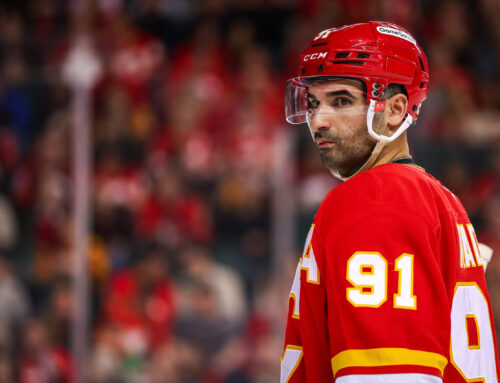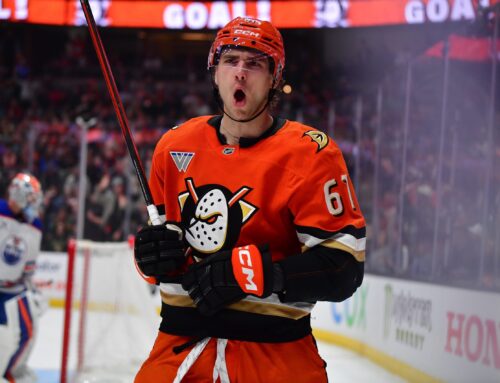Regular season hockey pools aren't usually impacted by poor postseason performances, but smart fantasy general managers can use the playoffs to bolster their roster for next season.
As mentioned last week, selling high after a good postseason run can help your fantasy squad. However, a poor postseason shouldn't impact the fantasy value too much. We're talking small sample sizes for many players. Come draft time in one-year leagues, are you going to care that Evgeni Malkin had only one point in four postseason games? In keeper leagues, are you going to let a three-game sweep of the Rangers devalue Kaapo Kakko's pointless postseason debut? The answer to both should be a definite no.
However, for some players, the postseason was either the start of, or the continuation of, concerns for next season and is something fantasy GMs need to be aware of. Some players who struggled throughout the regular season saw those problems extend into the playoffs despite a four-month break. For others, they were shifted around the lineup in such a way that doesn't bode well for next year.
Below are 10 players whose poor postseason could be a harbinger for next year.
10. Ondrej Kase
Coming into the 2019-20 season, it appeared as if big things were on the way for Kase if he could stay healthy. He couldn't stay in the lineup, and his production dropped off as well. Going to a more talented team in Boston gave some fantasy general managers some hope, but the playoffs may have dashed whatever optimism they had. He had four points (all assists) in 11 postseason games while playing less than 14 minutes per night.
Gaudreau had a disappointing regular season, and despite seven points in 10 postseason games, many fans consider his postseason a disappointment as well. Plenty of fans are calling for him to be dealt. I wonder how this may affect his play next year, especially if he gets off to a slow start. Imagine the furor if he has only two points in his first 10 games. No one knows yet if fans will be allowed in the buildings next year, but even if not, there would be tremendous pressure on him should this arise. He wouldn't be the first player to struggle while fans call for his head and it will be interesting to see how he handles pressure.
Last year, Pacioretty had 11 points in seven postseason games and was considered a stud. This year he had eight points in 16 games and was a disappointment. Mike Clifford had a great breakdown of some of Vegas' power-play issues last week in this Ramblings, basically saying the team was wrong to try to set up Pacioretty in the slot for a one-timer as Pacioretty has a history of not scoring much in that position. It will be interesting to see if Vegas changes up their power-play usage because of it.
In 66 regular season games, Konecny scored 24 goals and 61 points while posting 23 power-play points, all of which led the Flyers, so much was expected for Konecny in the postseason. Instead, in 16 postseason games, he had zero goals, seven points and zero power-play points, and was eventually taken off the top power-play line. Not a good showing for the 23-year-old and it shows he can be on a short leash if he struggles next season.
Schultz still has a few fantasy hockey supporters, but he's only had one season where he put up at least 35 points. This year, he was snakebitten in the regular season (12 points in 46 games), and looked even worse in the postseason. Not only did he have just one point in four games, he and defense partner Jack Johnson also seemed to be on the ice every time Montreal scored or had any type of offensive zone pressure. It didn't help matters that Pens GM Jim Rutherford basically blamed Schultz while giving Johnson a pass after the series loss. Schultz is an unrestricted free agent this offseason, but this playoff might ensure that he will be paid and treated like a bottom-pair defenseman for next season.
5. Adam Boqvist
I've mentioned this before, but don't assume that Boqvist will automatically take over the power-play duties for Chicago at the start of next season, and don't be surprised if that honour goes to Duncan Keith. Keith dominated that top quarterback spot toward the end of the regular season and into the playoffs. Boqvist finished the postseason with zero points in eight games, with seven shots and a minus-five rating. He also played only 25 per cent of Chicago's man-advantage minutes and was sixth among Hawks defensemen in overall minutes per game. None of this should impact his fantasy potential, but don't anoint him as the top guy just yet.
4. Tyson Barrie
Despite being the power-play quarterback for the Leafs in the five-game play-in round, Barrie put up a goose egg in points. That's not good for a team who was third in the league in the regular season in power-play percentage. Worse still, he was fifth on the team among defensemen in even strength ice time per game. If he had a great postseason and the Leafs had gone on a run, there's a good chance he would have re-signed and he'd still be running the power play next year. Now he has to go to a team that is probably not as good and possibly battle for ice time.
The man who played in the All-Star game in January wound up not starting a single postseason game. The only action he saw came in the final game, when he came in in relief of Cam Talbot. Rittich gave three goals on nine shots in less than 17 minutes before getting pulled as well. Talbot was excellent for the Flames in the postseason, and even though he is a UFA this offseason, there's a good possibility he'll be back. This is the second straight year the Flames have passed over Rittich in the postseason (last year, Mike Smith started all five games). Rittich has one year left on his contract, but can't be trusted upon in the postseason, which isn't a good sign for a 28-year-old netminder.
2. Max Domi
There are plenty of reasons to be concerned about Domi's usage for next season. In an effort to shift the offense throughout the lineup, Domi spent a good chunk of Montreal's 10-game postseason on the fourth line with Dale Weise, Alex Belzile and Jordan Weal. That goes a long way to explain why he had zero goals and three points in the postseason. Another concern is his ice time. I normally shy away from mentioning postseason ice time since overtimes will skew every player's ice time up. That said, Domi's ice time decreased from 17:06 in the regular season to 14:21 in the postseason. That's not a good sign. If he's not traded, he may be a bottom-six player again next season.
In three of the past four regular seasons, Marchessault has hovered just under a 60-point pace. Of course, he had that one outlier season where he had an 80-point pace, but it appears that you can't expect it to be his norm. In the postseason, however, he had 10 points in 20 games, and only two in his last 11. Maybe even a little more concerning is that for the first time in a while, Vegas decided to lean heavily on one power-play unit. Vegas tends to divide its power play time evenly between two units. For the last six games of the postseason, that changed, when some players were averaging four minutes of power-play time per night while Marchessault averaged 2:26. That's not a positive sign for next season.





 FLA
FLA CHI
CHI NYR
NYR PIT
PIT L.A
L.A COL
COL CBJ
CBJ ANA
ANA MTL
MTL TOR
TOR WPG
WPG SEA
SEA S.J
S.J VAN
VAN BOS
BOS BUF
BUF
